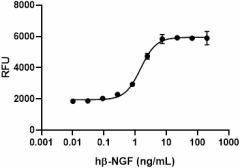- Regulatory Status
- RUO
- Other Names
- Beta-nerve growth factor, Ngf, Ngfb, Beta-NGF, Nerve Growth Factor Beta Subunit

-

Recombinant human β-NGF induces proliferation of TF-1 human erythroleukemic cells in a dose-dependent manner with an ED50 range of 0.4 - 4 ng/mL. -

Stability testing for recombinant human β-NGF.Recombinant human β-NGF was aliquoted in 0.1% TFA at 0.2 mg/mL. One aliquot was frozen and thawed four times (4x Freeze/Thaw), and compared to a control kept at 4°C (Control). The samples were tested in a proliferation assay with TF-1 human erythroleukemic cells.
| Cat # | Size | Price | Quantity Check Availability | ||
|---|---|---|---|---|---|
| 788502 | 10 µg | $54.00 | |||
| 788504 | 25 µg | $94.00 | |||
| 788506 | 100 µg | $223.00 | |||
Neurotrophins are growth factors that modulate growth, differentiation, and survival of neurons. These structurally related proteins include nerve growth factor (NGF/β-NGF), brain-derived neurotrophic factor (BDNF), neurotrophin-3, and neurotrophin-4/5. They are highly homologous and share a similar structure of a tertiary folded, cysteine rich "knot." Neurotrophins are critical to the development of the central and peripheral nervous systems, and they play important roles in injury-induced neuron regeneration. β-NGF is a member of the neurotrophin family which controls growth, survival, and maturation of neurons. In peripheral and central neurons, neurotrophins are important regulators for survival, differentiation, and maintenance of nerve cells. They are detectable throughout embryogenesis and into the adult stage in the central and peripheral nervous systems. In animal models, β-NGF prevents neuronal degeneration and has become a therapeutic target in neuron regeneration studies. β-NGF is also critical for the survival and maintenance of sympathetic and sensory neurons. It is the main neurotrophin that maintains homeostasis of neurogenesis. It prevents neurons from undergoing apoptosis and promotes maturation while supporting axonal branching. Two receptors are known to interact with NGF: p75NTR and TrkA. The NGF-TrkA signaling pathway induces two pathways through activation of PI3K-Akt or Ras-MAPK. Either one of the pathways leads to CREB phosphorylation and increases expression of anti-apoptosis genes to keep neurons alive. Animal models of neurodegenerative diseases suggest that NGF can promote myelin repair of neurons in the peripheral nervous system. Clinical studies indicate that dysregulation of NGF signaling is related to Alzheimer's disease.
Product Details
- Source
- Human β-NGF, amino acid Ser122-Ala241 (Accession # P01138), was expressed in CHO cells.
- Molecular Mass
- The 120 amino acid recombinant protein has a predicted molecular mass of approximately 13.5 kD. The DTT-reduced protein migrates at approximately 14.5 kD and the non-reduced protein migrates at approximately 13.5 kD by SDS-PAGE. The predicted N-terminal amino acid is Ser.
- Purity
- >95%, as determined by Coomassie stained SDS-PAGE.
- Formulation
- 0.22 µm filtered protein solution is in 0.1% TFA.
- Endotoxin Level
- Less than 0.1 EU per µg protein as determined by the LAL method.
- Concentration
- 10 and 25 µg sizes are bottled at 200 µg/mL. 100 µg size and larger sizes are lot-specific and bottled at the concentration indicated on the vial. To obtain lot-specific concentration and expiration, please enter the lot number in our Certificate of Analysis online tool.
- Storage & Handling
- Unopened vial can be stored between 2°C and 8°C for up to 2 weeks, at -20°C for up to six months, or at -70°C or colder until the expiration date. For maximum results, quick spin vial prior to opening. The protein can be aliquoted and stored at -20°C or colder. Stock solutions can also be prepared at 50 - 100 µg/mL in appropriate sterile buffer, carrier protein such as 0.2 - 1% BSA or HSA can be added when preparing the stock solution. Aliquots can be stored between 2°C and 8°C for up to one week and stored at -20°C or colder for up to 3 months. Avoid repeated freeze/thaw cycles.
- Activity
- The ED50 = 0.4 - 4 ng/mL as measured by the ability of the protein to induce proliferation of TF-1 human erythroleukemic cells.
- Application
-
Bioassay
- Application Notes
-
BioLegend carrier-free recombinant proteins provided in liquid format are shipped on blue ice. Our comparison testing data indicates that when handled and stored as recommended, the liquid format has equal or better stability and shelf-life compared to commercially available lyophilized proteins after reconstitution. Our liquid proteins are verified in-house to maintain activity after shipping on blue ice and are backed by our 100% satisfaction guarantee. If you have any concerns, contact us at tech@biolegend.com.
Antigen Details
- Structure
- Homodimer
- Distribution
-
Broad expression including hypothalamus, pituitary, thyroid gland, testes, epididymis, vascular smooth muscle cells, fibroblasts, myofibroblasts, mast cells, eosinophils.
- Function
- Important for the development and maintenance of the sympathetic and sensory nervous systems.
- Interaction
- Neurons, astrocytes, eosinophils, B, T, and mast cells.
- Ligand/Receptor
- Low-affinity NGF receptor (p75NTR); high-affinity NGF receptor (TrkA)
- Bioactivity
- Measured by its ability to induce proliferation of TF-1 cells
- Cell Type
- B cells, Embryonic Stem Cells, Fibroblasts, Mast cells, Neural Stem Cells, Neurons, T cells
- Biology Area
- Cell Biology, Cell Proliferation and Viability, Neurodegeneration, Neuroscience, Stem Cells, Synaptic Biology
- Molecular Family
- Cytokines/Chemokines, Growth Factors
- Antigen References
-
- Ullrich A, et al. 1983. Nature. 303:821.
- Klein R, et al. 1991. Cell. 65:189.
- Welker P, et al. 2000. Immunology. 99:418.
- Fahnestock M, et al. 2004. Prog Brain Res. 146:101.
- Bruno MA & Cuello AC. 2006. Proc Natl Acad Sci U S A. 103:6735.
- Aloe L, et al. 2015. Curr Neuropharmacol. 13:294.
- Gene ID
- 4803 View all products for this Gene ID
- UniProt
- View information about beta-NGF on UniProt.org
